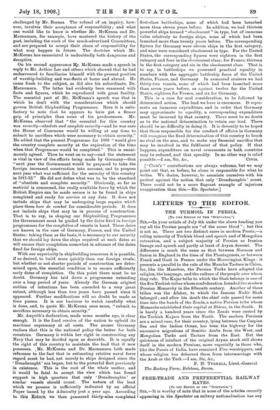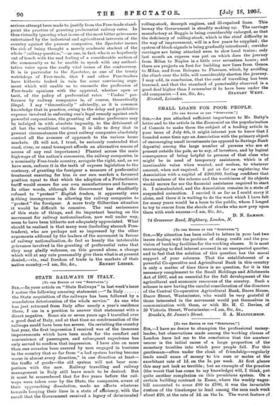FREE-TRADE AND PREFERENTIAL RAILWAY RATES.
150 THE EDITOR OF THE " SPECTATOR:1 SIR,—It is worthy of note that in none of the articles recently appearing in the Spectator on railway nationalisation has any serious attempt been made to justify from the Free-trade stand- point the practice of granting preferential railway rates. In thus virtually ignoring what is one of the most bitter grievances entertained by the industrial and agricultural interests of the country against the present companies, the Spectator incurs the risk of being thought a merely academic student of the whole "railway question,"—as one, in fact, who is so hopelessly out of touch with the real feeling of a considerable section of the community as to be unable to speak with any authori- tative voice upon the really vital issues of the controversy. It is in particular to the Spectator, as one of the trusty watchdogs of Free-trade, that I and other Free-traders have hitherto looked in vain for some convincing argu- ment which will enable us to reconcile the profession Of Free-trade opinions with the approval, whether open or tacit, of the policy of preferential rates. " Undue " pre- ference by railway companies is, of course, theoretically illegal. I say " theoretically " advisedly, as it is common knowledge that in practice, owing to the delay and prohibitive expense involved in enforcing one's legal remedy against such powerful corporations, the granting of undue preference may be indulged in with absolute impunity, to the detriment of all but the wealthiest victims. It is idle to deny that in present circumstances the great railway companies absolutely control all the avenues of approach to the various home markets. (It will not, I trust, be seriously contended that road, river, or canal transport affords an alternative means of access of any real importance.) Planted across the main highways of the nation's commerce, the railway companies, in a nominally Free-trade country, arrogate the right, and, as we have seen, enforce it in the teeth of express legislation to the contrary, of granting the foreigner a measure of preferential treatment ensuring for him in our own markets a favoured position equal to that which the adoption of a Protectionist tariff would ensure for our own manufacturers and farmers. In other words, although the Government has steadfastly refused to "protect" English traders, it apparently sees nIthing incongruous in allowing the railway companies to "protect" the foreigner. A more truly Gilbertian situation it would be. difficult to conceive. The real seriousness of this state of things, and its important bearing on the movement for railway nationalisation, now well under way, seem to have been hitherto not adequately appreciated. What should be realised is that many men (including staunch Free- traders), who are perhaps not so impressed by the other arguments adduced by the leaders of the movement in favour of railway nationalisation, do feel so keenly the intolerable grievance involved in the granting of preferential rates that they may gladly welcome, on this ground alone, a change which will at any rate presumably give them what is at present denied,—viz., real freedom of trade in the markets of their .native country.—I am, Sir, &c., ERNEST LESSER.







































 Previous page
Previous page